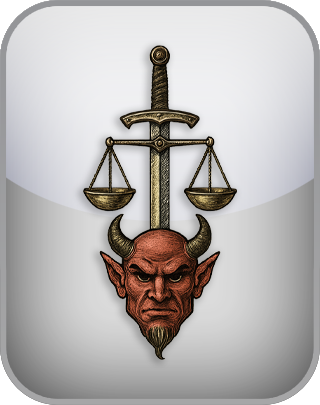Psychometric Moral Alignment Test
The Dungeons & Dragons Moral Alignment system, ranging from Lawful Good to Chaotic Evil, has become a popular way to describe personalities and ethical styles across the internet. While originally rooted in fantasy role-playing, these alignments have taken on a life of their own in memes, personality quizzes, and social media debates. This test offers a fresh take by grounding the alignment chart in real psychological research.
The Good–Evil axis draws on modern personality science, specifically the Light Triad (Kaufman et al., 2019) and the Dark Triad (Paulhus & Williams, 2002). These traits capture your orientation toward empathy, kindness, and integrity on one end, and narcissism, Machiavellianism, and psychopathy on the other.
The Lawful–Chaotic axis is adapted from two major psychological frameworks. The first is Conscientiousness, one of the Big Five personality traits (McCrae & Costa, 1987), which reflects how structured, rule-following, and self-disciplined you tend to be. The second is Moral Foundations Theory (Haidt & Graham, 2007), particularly the dimension of Authority versus Subversion, which taps into how much you value order, tradition, and institutional rules.
By aligning your responses with these well-established theories, this test alignment test goes beyond internet memes to offer a psychologically informed view of your moral alignment.
Question 1 of 30
I often help others without expecting anything in return.
| Disagree | Agree |
NEXT
Understanding where you fall on the Dungeons & Dragons moral alignment chart has long been a favorite pastime for fans of fantasy, storytelling, and personality quizzes. Whether you're trying to figure out if you're a true Neutral Good hero or a chaotic wildcard with noble intentions, the alignment system captures something instantly recognizable about how we see ourselves—and how we operate in the world. But unlike most alignment quizzes, this one isn’t based on vague archetypes or gut-feel questions. Instead, it’s rooted in psychological research that explores real, measurable human behavior.
The test is designed to provide a meaningful interpretation of your values and tendencies, using the familiar framework of D&D's two intersecting axes: Lawful–Chaotic and Good–Evil. Each of these dimensions corresponds to underlying psychological traits studied by researchers for decades. The result is a personality profile that feels both entertaining and insightful, allowing you to explore your alignment through a lens of real-world behavioral science.
One of the test’s central innovations is in how it approaches morality. Rather than simply asking whether you see yourself as “good,” it draws on the Light Triad and Dark Triad models of personality to reveal your orientation toward others. The Light Triad, developed by Kaufman et al. (2019), measures traits like compassion, humility, and empathy. In contrast, the Dark Triad (Paulhus & Williams, 2002) looks at socially aversive traits like narcissism, Machiavellianism, and psychopathy. Together, they help map a more nuanced moral dimension than typical pop culture quizzes provide.
On the other axis, the test taps into how you relate to rules, structure, and authority. This Lawful–Chaotic spectrum is based on the personality trait of Conscientiousness from the Big Five model (McCrae & Costa, 1987), along with Jonathan Haidt’s Moral Foundations Theory (2007), which includes a respect-for-authority dimension. High scorers on Lawful traits tend to prefer order, reliability, and rule-based systems, while those who lean Chaotic are often more spontaneous, anti-authoritarian, or resistant to imposed structure.
What makes this test especially engaging is the combination of fantasy and science. While the alignment categories still reference archetypes like the Lawful Evil tyrant or the Chaotic Good rebel, your placement is calculated using real research-backed items. This mix of imaginative categorization and psychological grounding makes for a uniquely satisfying result—one that tells a story about who you are while also pointing to deeper patterns in how you think, act, and relate to others.
Whether you're a gamer, a writer developing characters, or just someone curious about your inner compass, this test offers more than just entertainment—it’s a conversation starter, a self-reflection tool, and a psychological snapshot all in one.
References
- Johnson, Laura K.D. (2018): "The Light Triad Scale: Developing and Validating a Preliminary Measure of Prosocial Orientation.” Electronic Thesis and Dissertation Repository. 5515.
- Kaufman, S., Yaden, D., Hyde, E., & Tsukayama, E. (2019): “The light vs. dark triad of personality: Contrasting two very different profiles of human nature.” Frontiers in Psychology.
- Dowgwillo & Pincus: Differentiating Dark Triad Traits Within and Across Interpersonal Circumplex Surfaces (Assessment 2016).
- Furham, Richard & Paulhus: The Dark Triad of Personality: A 10 Year Review (Social and Personality Psychology Compass Volume 7, Issue 3, 2013) pp. 199-216.
- Jonason, Kaufman, Webster & Geher: What Lies Beneath the Dark Triad Dirty Dozen: Varied Relations with the Big Five (Individual Differences Research 2013, Vol 11. No. 2) pp. 81-90.
- McCrae, R. R., & Costa, P. T., Jr. (1999). A five-factor theory of personality. In L. A. Pervin & O. P. John (Eds.), Handbook of personality: Theory and research (2nd ed., pp. 139–153). New York: Guilford Press.
- John, O. P., Naumann, L. P., & Soto, C. J. (2008). Paradigm shift to the integrative Big Five trait taxonomy: History, measurement, and conceptual issues. In O. P. John, R. W. Robins, & L. A. Pervin (Eds.), Handbook of personality: Theory and research (3rd ed., pp. 114–158). New York: Guilford Press.
- Haidt, J., & Graham, J. (2007). When morality opposes justice: Conservatives have moral intuitions that liberals may not recognize. Social Justice Research, 20(1), 98–116.
- Graham, J., Haidt, J., & Nosek, B. A. (2009). Liberals and conservatives rely on different sets of moral foundations. Journal of Personality and Social Psychology, 96(5), 1029–1046.

 English
English  Español
Español  Português
Português  Deutsch
Deutsch  Français
Français  Italiano
Italiano  Polski
Polski  Русский
Русский  Türkçe
Türkçe  العربية
العربية  日本語
日本語  한국어
한국어  ไทย
ไทย  汉语
汉语  हिन्दी
हिन्दी  Bahasa
Bahasa 